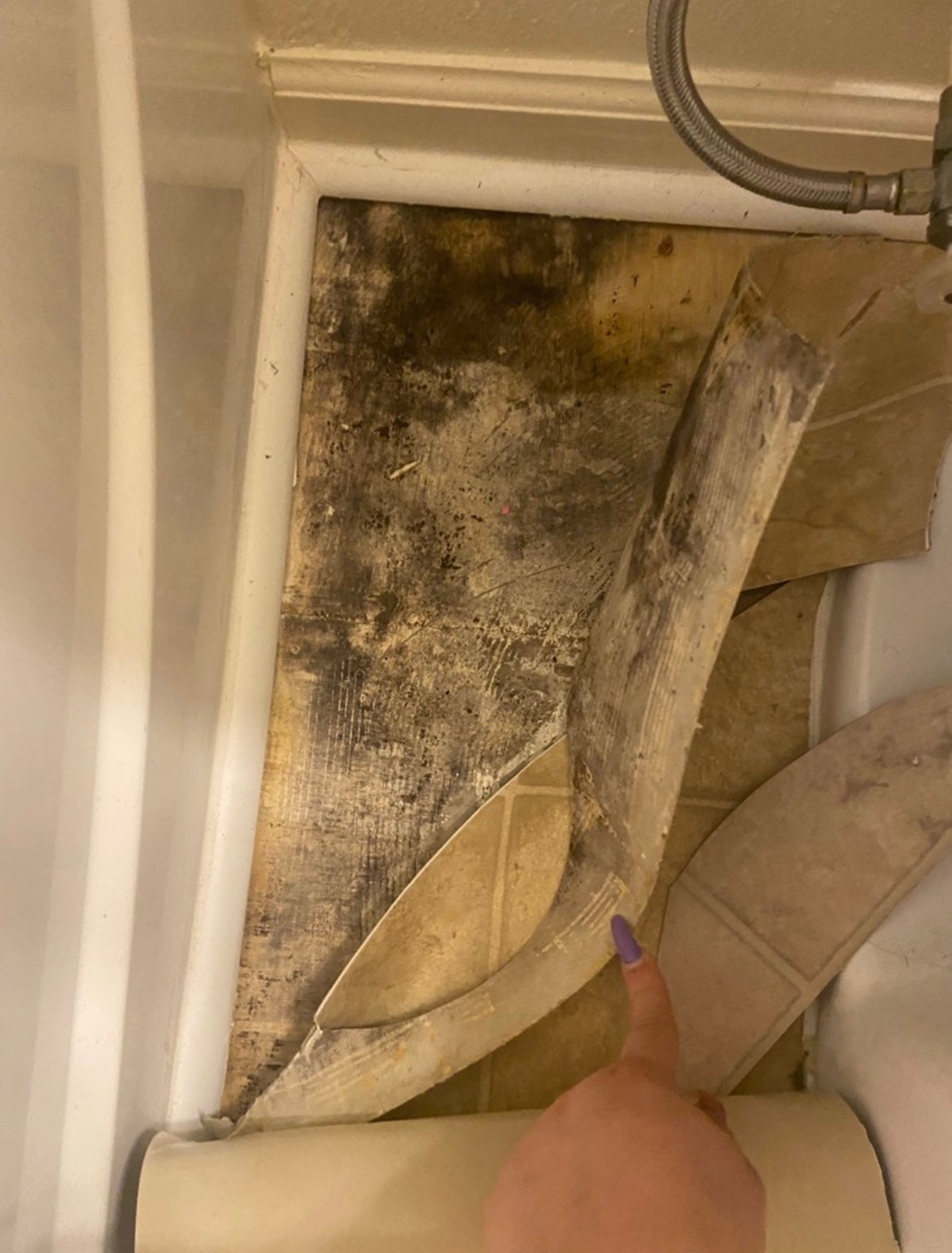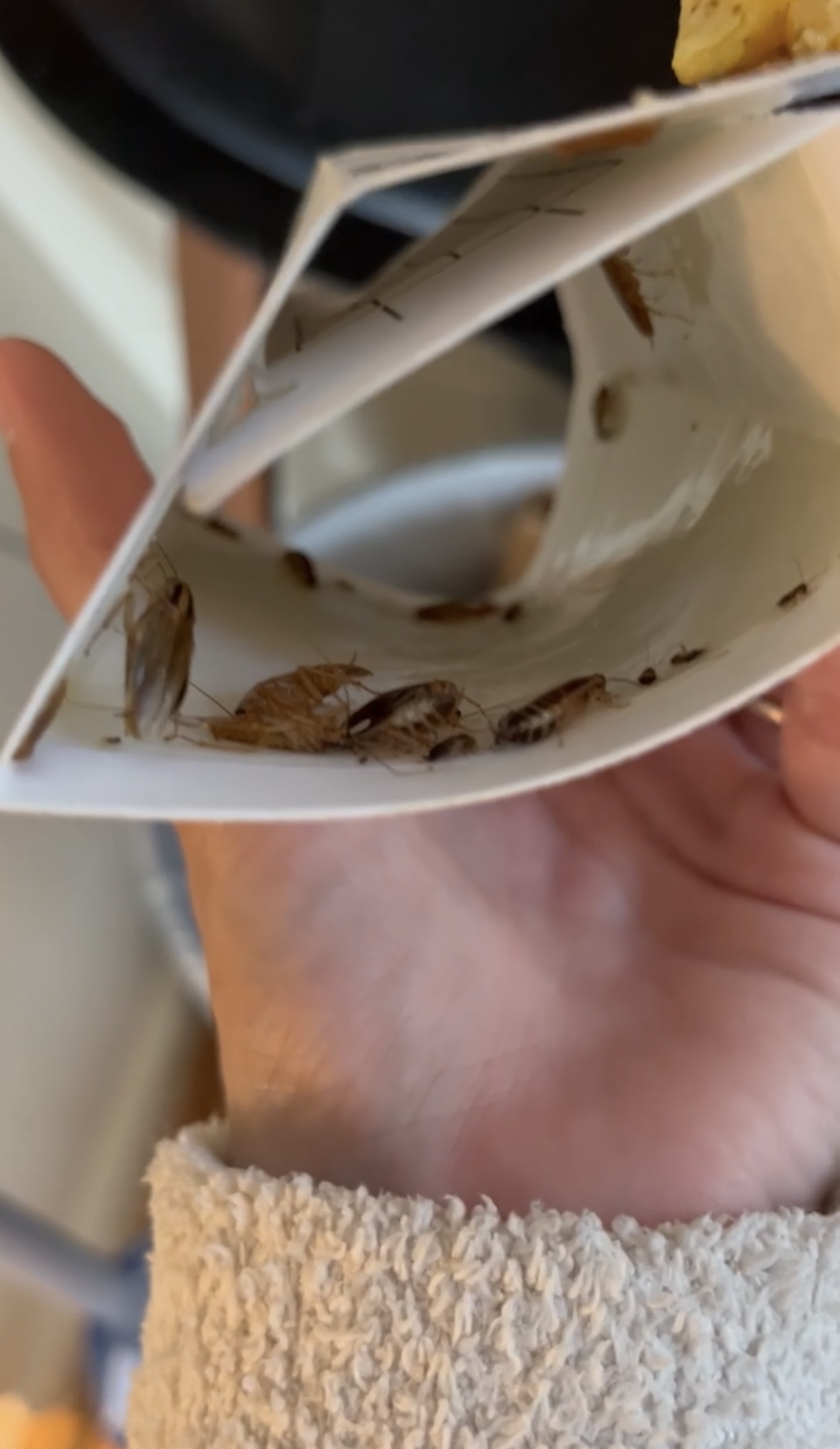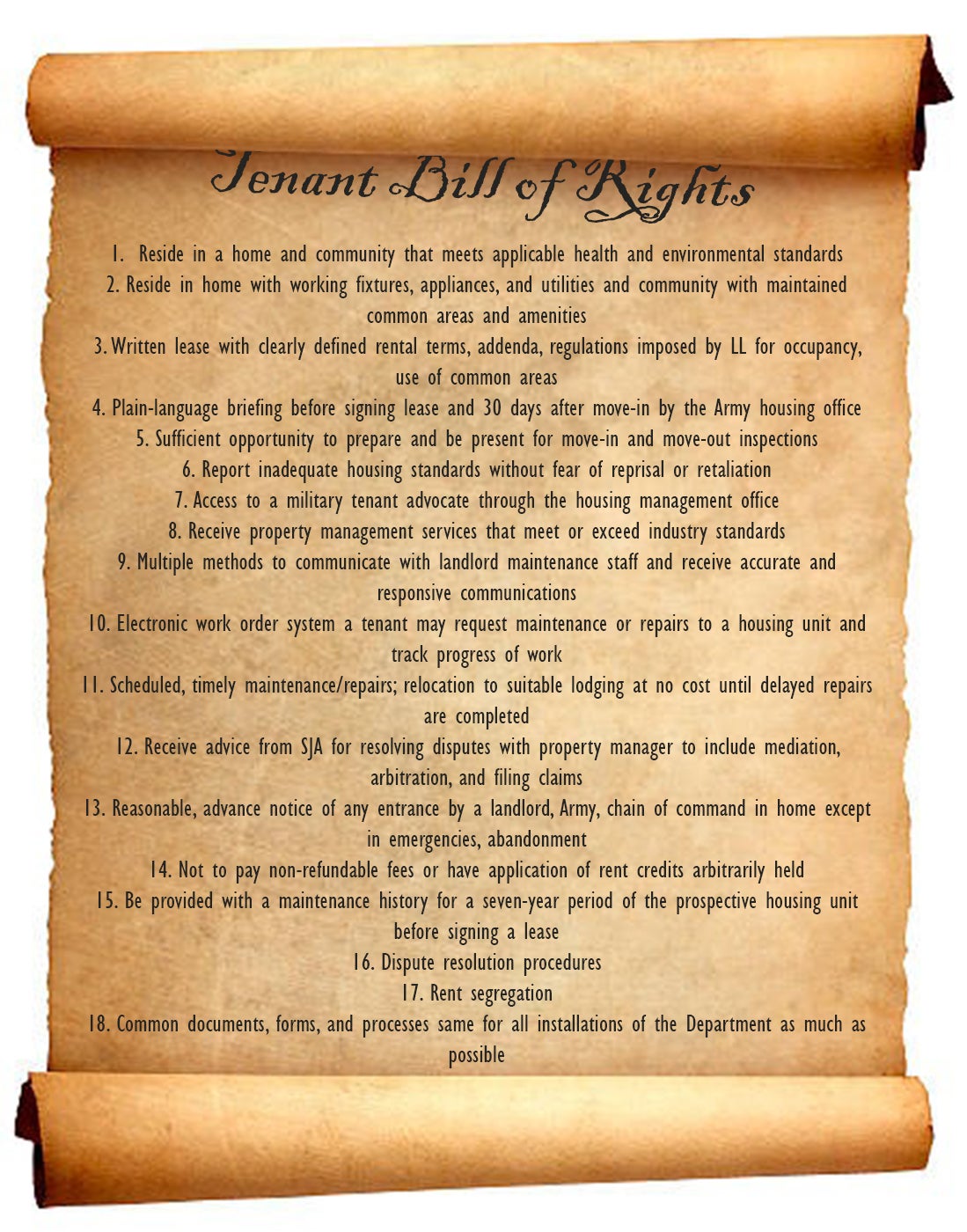An Army family at Fort Belvoir, Virginia, says they have been displaced from their home for more than 50 days after finding mold in their home, and dead animals and insects in their vents.
The housing at Fort Belvoir is run by The Michaels Organization, which took over the portfolio from Clark Realty Capital last year. The Michaels Organization’s website calls The Villages at Belvoir a “welcoming enclave defined by character and convenience,” full of “charming homes” and run by a “management team dedicated to improving your quality of life.”
That’s far from the experience that Breanna Bragg and her husband, Army Staff Sgt. Denzale Bragg, have had.
The Bragg family, which also includes two children ages seven and one, have been living in a temporary home since June after a leak began pouring water from their second-floor bathroom through the ceiling into their dining room. During the time they’ve been out of their house, Breanna said the family has found mold, dead animals in the vents, and an insect infestation because of the dead animals.
They don’t have any of their things at the new home, Breanna said; they’ve been worried about contamination and ensuring that their things are safe. But she said that when the issue was discussed with a representative of The Villages at Belvoir, she was told if they wanted their household goods replaced, they’d have to sign a non-disclosure agreement.

“Terrible is the best adjective to describe this,” Breanna said on Tuesday. “And just to have our household goods that they’ve ruined replaced they’re like, ‘Oh you’ve got to sign an NDA just to get your things back.’ And they use it as leverage. It’s just not right.”
Subscribe to Task & Purpose Today. Get the latest military news, entertainment, and gear in your inbox daily.
A Michaels Organization representative denied using “NDAs in order to resolve maintenance requests” in a statement on Wednesday, and said they have “not asked any of these residents to sign an NDA.” The statement also said that Fort Belvoir Residential Communities and the Michaels Organization’s local management team “work diligently to promptly resolve any issues that arise with residents’ individual homes.”
The Braggs are not the only family currently displaced. A Fort Belvoir spokesman, Joe Richard, confirmed on Wednesday that 12 families are currently displaced “while remediation teams [work] to restore conditions to safe, acceptable standards.” Four of those families were moved from their homes because of damage from lightning strikes, Richard said.

Furthermore, the families who are displaced are not the only ones facing challenges with their housing.
One Army spouse who spoke to Task & Purpose on condition of anonymity as she and her husband, an enlisted soldier, are still working on addressing their problems, described a roach infestation in their home at Fort Belvoir. In provided videos and photos, roaches ranging in size are seen crawling in the family’s empty dishwasher, behind their coffee pot, on the wall behind the television, and on the carpet in the hallway. She said their WiFi stopped working, and when her husband turned over the router, roaches dumped out of the inside. They have since gotten a new one.
The woman, who has two children including a baby, said they’d asked for displacement but were told it was unnecessary. On Wednesday, however, they were told they were approved for displacement.
“I want my stuff cleaned, replaced, something, because I’m like, they lay eggs,” the woman said of the roaches, adding that a pest control employee who came to spray her house said he was “dumbfounded” by how many roaches were inside and said he didn’t know “where they’re coming from.”
[embedded content]
The Bragg family’s problems started in June, according to a timeline that they emailed to more than a dozen Army leaders and officials on Aug. 6. On June 24, Staff Sgt. Denzale Bragg said, their house flooded and water was dripping into the dining room from the ceiling. It’s unclear if it was a new problem, as work orders from 2015 viewed by Task & Purpose show that a previous resident had complained about “a water leak coming through the dining room ceiling.” Nevertheless, when The Villages of Belvoir were alerted of the problem, Denzale said, they “claimed the flooding was due to our air filters needing replacement.”
The next day, Denzale said he was using the home’s master bathroom when sewage began leaking “through the vent on the ceiling in the dining area.”
“Again,” Denzale said in the email, “maintenance staff opted to change the air filters in the home.”
They ultimately convinced maintenance staff to check the pipes in the upstairs bathroom Denzale had been using. The email says a hole was then cut in the ceiling where the leaking was coming from; a video taken that day and provided to Task & Purpose shows a heavy dripping of water coming from a hole in their dining room ceiling.
[embedded content]
That day, on June 25, the Braggs were placed in temporary housing where they remain today. And since then things have only gotten worse. Breanna told Task & Purpose she found mold growth in their bathroom, covered up by layers of laminate flooring. They sought legal counsel, and in the email to Army leaders this month, Denzale said the inspector found wood rot, mold, “dead animals and nesting in exterior vents, and infestation from the insects that were feeding on the dead animals.”
And while they were finally offered a new home, Breanna said they have nothing to fill it with. Items from the bathrooms they found to be contaminated with mold were moved onto their beds and furniture, they said in their email this month. The email also said that a request to have an inspector determine which items were safe to take with them was denied by the community director for The Villages of Belvoir.
“All of my things are ruined,” she said. “I’ve been begging them for the past month and a half, almost two months now, to replace my things because they’ve offered us a new house but I have nothing. I’ve lost everything.”
Breanna said the project director for The Villages at Belvoir, Zach Allen, told her over the phone that if they wanted their household goods replaced, they’d have to sign a non-disclosure agreement. She confronted Allen about the NDA in an email on Aug. 13, sent to more than 18 Army officials including Sgt. Maj. of the Army Michael Grinston and Gen. Edward Daly, the head of U.S. Army Materiel Command.
In the email, Breanna praised her husband’s chain of command for “tirelessly” advocating for her family, but called Allen’s behavior “deplorable.”

“How dare you destroy the lives of military families and bribe them with chump change to sign an NDA so your abuse continues to go undetected … How many families have you destroyed that you’ve forced to sign NDA’s? How many families have chosen to start their entire lives over just to have a chance to speak their truth of your abuse in the future?” Breanna said in the email.
Although The Michaels Organization denied using NDAs to resolve maintenance issues, they would not be the first privatized housing company to do so. Task & Purpose reported in 2019 that another housing provider, Patrician Management, would require a Navy family to sign an agreement that they would not post about remediation efforts on social media if they were to go forward with them.
Indeed, the Fort Belvoir housing issues are just one more case in a long line of privatized military housing concerns, which were first exposed by Reuters in a series of reports in 2018 and 2019. Since then, housing companies and military leaders have testified before Congress about families’ living conditions, and the Pentagon has released a “Tenant Bill of Rights” in an attempt to put more power back into residents’ hands.
The Tenant Bill of Rights, released in 2020, gives privatized military housing residents the right to their home’s maintenance history, the right to withhold rent payments, and the right to live in a home that meets health and environmental standards.
But Breanna said it made little difference in her family’s situation, which she believes is due to contracts between the military and housing companies that span decades.

Even while putting together the Tenant Bill of Rights it was clear just how much power the military had when negotiating with the housing companies. Then-Defense Secretary Mark Esper told lawmakers that the legal contracts between the Defense Department and the housing companies were getting in the way of their ability to install three of the most critical provision in the bill of rights. A defense official talking to reporters in March 2020 echoed that sentiment, saying that the financial lenders behind the Military Housing Privatization Initiative were not comfortable with some of the rights that were most important to military families.
In essence, while service members and their families were being screwed over left and right, the Defense Department still had to “be sensitive” to the bondholders who were loaning the money on the housing projects. Since then, the full tenant bill of rights has been implemented, though Breanna said it has done little to help her and her family. In one meeting with a Michaels representative, she said she was told that the Tenant Bill of Rights was just “guidelines” that they didn’t “have to follow.”
Ultimately, the said the most frustrating part of her family’s situation is how it is impacting her kids, Breanna said. Her 7-year-old daughter gets scared at night in the house they’re living in because it’s unfamiliar, she said, and her baby’s sleep schedule is “completely off.” And all of this is on top of an already unstable lifestyle as military kids.
“Their life is already kind of unstable because of my husband’s job,” she said. “And in the middle of them getting accustomed to this duty station, their entire world got turned upside down … They’ve made it extremely difficult for kids who already have a difficult living situation.”
She said she believes the Michaels Organization doesn’t care about its military families, and just “use us for a check.”
“I feel like our military families already sacrifice enough,” she said. “Our family shouldn’t have to sacrifice our health.”
The latest on Task & Purpose
Want to write for Task & Purpose? Click here. Or check out the latest stories on our homepage.
